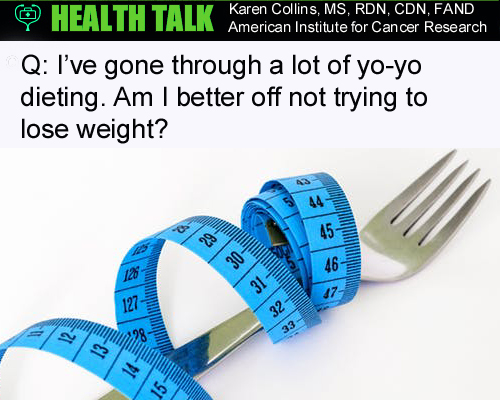Yo-Yo Dieting, Weight Loss and Health

Q: I’ve gone through a lot of yo-yo dieting. Am I better off not trying to lose weight?
A: Despite headlines from individual studies, research overall supports the idea that people with overweight or obesity can benefit from losing weight. In deciding whether or not now is the time for you to try to lose weight, the important message is to aim for a healthy weight that’s reasonable for you, and keep your focus on creating a long-term healthy lifestyle.
Weight cycling (sometimes called yo-yo dieting) is the term for repeated patterns of weight loss and regain. On average, about one in six people who are overweight lose 10 percent or more of their weight and maintain that loss.
At the 2016 AICR Research Conference, Dr. Michael Rosenbaum noted that although weight regain is often attributed to lack of willpower, powerful biologic influences affect body weight. Signals carried through the nervous system reflecting energy stores in body fat cells can trigger changes in appetite and metabolism that support a biological drive to regain weight.
Some researchers have questioned whether going through cycles of losing weight, regaining it, and then losing and regaining it again could pose health risks. On the surface, some studies do seem to link weight cycling with increased mortality over several years, increased abdominal fat accumulation, or greater risk of diabetes.
However, almost all the studies that show risk have not adjusted for weight/BMI itself, and whether weight change was intentional or illness-related. When studies adjust for influences like this, associations of weight cycling and health risks generally disappear. People with overweight and obesity already face health risks; for them, weight cycling does not seem to add further health risk.
Here’s what you can do…
–Exercise: The amount of muscle loss during weight loss seems to be crucial. People who unintentionally lose weight during illness, or who cut calories drastically and do not exercise, likely lose lean body mass (muscle) and fitness, and face cardiovascular risks with weight regain. On the other hand, obese patients who intentionally lose weight during a cardiac rehab program – which includes exercise – show reduced health risks.
–Eat healthy: As a registered dietitian nutritionist (RDN) who worked with many clients over the years, I noticed that during periods of weight regain, people were generally eating more sweets and high-calorie snacks. This could be due to a biological drive, psychological effects of trying to cut calories with an all-or-nothing mindset that led to feelings of deprivation, or the challenge faced in any long-term habit change. Regardless of effects on weight, this eating pattern is not promoting health.
–Start small: Large weight loss and regain may pose more risk than smaller shifts, according to some studies. That’s important, since research shows that health benefits of weight loss occur with relatively small loss.
Loss of 5 to 10 percent is the target recommended by major health organizations, and health can benefit even with a 3 to 5 percent loss. If you want to lose more, focus first on making sure you’ve established habits that can maintain that loss for several more months; then discuss with your healthcare provider whether further weight loss is likely to bring more health benefits.
–Focus on your health: If you are currently at a healthy weight, don’t let society pressures push you to seek weight loss. Evidence suggests that it’s normal weight people who most likely face heart health and diabetes risks with yo-yo weight cycling.
→ 8 Diet Tips to Guarantee You Will Lose Weight and Have More Energy
AICR CUP reports conclude that obesity increases risk of at least 11 forms of cancer. If you are overweight, consider the studies that show modest weight loss of about 10 percent reduces levels of estrogen, insulin and a marker of inflammation called CRP. These are key pathways that research shows link obesity and cancer, so it seems reasonable that these changes would reduce risk.
Rather than making weight the primary focus, try working one step at a time to make healthy eating choices and at least 30 to 60 minutes of moderate physical activity throughout each day true lifestyle habits – rather than temporary changes. In doing so, you will likely work both through and outside of weight to lower cancer risk and promote overall health.
February 10, 2017
The Author:
Karen Collins, MS, RDN, CDN is AICR’s Nutrition Advisor, a speaker, writer and consultant who specializes in helping people make sense of nutrition news. You can follow her blog, Smart Bytes® and follow her on Twitter @KarenCollinsRD.








